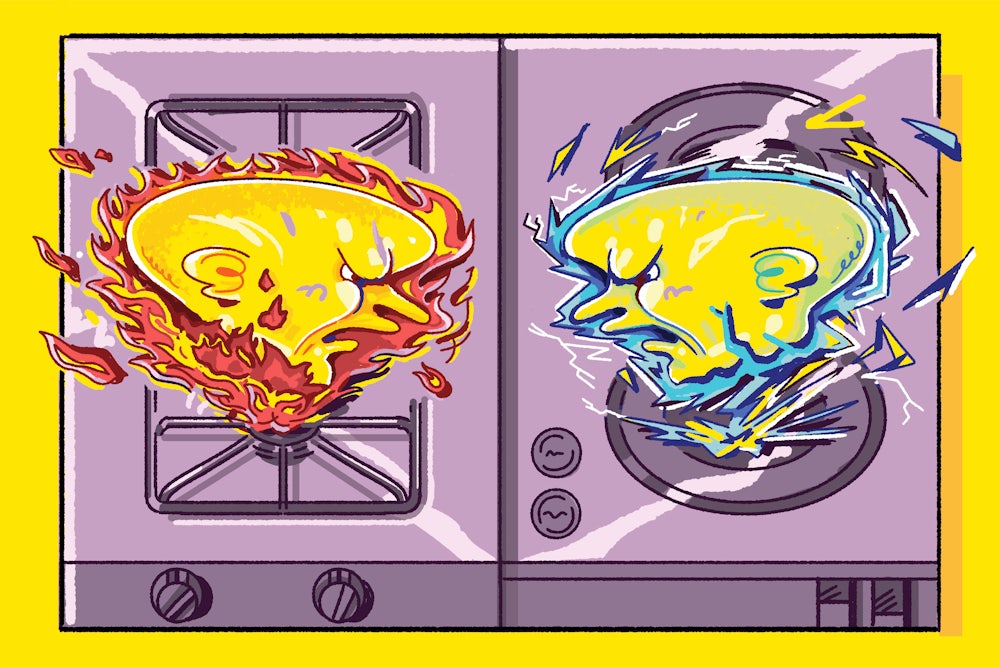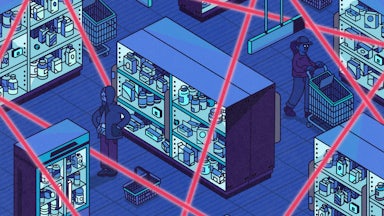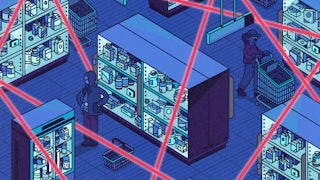We’ve known for a while that gas stoves are bad for both your health and the environment. But a few weeks ago, the discourse went into overdrive. First, the Consumer Product Safety Commission announced it would consider regulations on indoor air pollution from gas stoves. Not long after, a study asserted that gas-burning stoves are responsible for roughly 12.7 percent of childhood asthma cases nationwide. Suddenly, the appliance acquired a crowd of newly passionate defenders, including Tucker Carlson, who warned that the government was coming for your gas stoves, and Florida Republican Representative Matt Gaetz, who tweeted a video of a gas stovetop flame accompanied by the words: You’ll have to pry it from my COLD DEAD HANDS! #FoodieRevolt. How did the debate about whether (and how) to regulate gas stoves so rapidly morph into political Kabuki? On episode 60 of The Politics of Everything, hosts Laura Marsh and Alex Pareene talk about the fossil fuel industry’s misinformation campaign, how our political views inform our consumer choices, and the ways the right leverages the perpetual outrage machine to avoid confronting daunting issues facing the planet. Guests include TNR deputy editor Heather Souvaine Horn; Marc Hetherington, who co-wrote Prius or Pickup? How the Answers to Four Simple Questions Explain America’s Great Divide; and TNR staff writer Alex Shephard.
Alex Pareene: What has Florida Governor and likely 2024 presidential hopeful Ron DeSantis so fired up that he’d open an event on drug prices with a stirring defense of a kitchen appliance?
Laura Marsh: The public conversation about gas stoves has shifted with remarkable speed—from a discussion of their potential health effects to a burning question of liberty.
Alex: The research into the negative effects of gas stoves is neither new nor controversial, and until recently, the threat of their regulation was of interest primarily to foodies.
Laura: So why exactly does policy become culture war, and how did the way we cook or drive or shop become so intertwined with how we vote?
Alex: Today on the show we’re cooking with gas, but for how long? I’m Alex Pareene.
Laura: And I’m Laura Marsh.
Alex: This is The Politics of Everything.
Alex: In mid-October, a date that feels like many lifetimes ago in the great gas stove debate, a study came out suggesting that gas appliances in California leak as much benzene, a carcinogenic chemical, each year as 60,000 cars. We’re speaking now with Heather Souvaine Horn, an editor at The New Republic who wrote about that research. Heather has compared the gas industry to the tobacco companies, which openly market and sell a product known to harm human health. As the evidence piles up about the dangers of gas stove, she asked, at what point does the natural gas industry become the new big tobacco? Heather, thank you for coming on the show.
Heather Souvaine Horn: Thanks for having me.
Alex: I feel like by the nature of our show and, and by Laura’s and my natures in general, we’re often interested in the meta-debate over these sorts of things, but I think before we get to that, we actually should just establish the actual evidence against gas stoves. What’s dangerous about them and how dangerous are they?
Heather: The first thing to know about this is that the research is not new. Studies were pointing to the possible health effects of nitrogen dioxide, which is one of the problematic compounds that gas stoves emit as early as the late ’70s and early ’80s. And there was this big meta-analysis of these studies in 92 that already estimated gas stoves to increase the odds of children developing respiratory illnesses by something like 20 percent. In the intervening decades, more and more studies accumulated highlighting these dangers. A lot of those focused on specifically nitrogen dioxide and respiratory health, particularly for kids, but a few other shoes have dropped more recently. As Alex pointed out, there was this study in October that looked at not nitrogen dioxide but benzene, and that was particularly alarming to people because benzene is a known carcinogen; it has been known to cause cancer for quite a while. I think the reason that this rocketed into people’s consciousness in October is that there’s really no safe level of exposure to benzene. Your level of exposure can be quite low, but because it accumulates in your body over your lifetime, and because the health risks increase pretty much linearly with that exposure, any amount of exposure to benzene is increasing your risk for cancer.
Alex: So one thing that sort of kicked off this entire debate were comments from Richard Trumka Jr., who is the commissioner of the Consumer Product Safety Commission. He said they were looking into regulating or even banning gas stoves. Funnily enough, we just talked about the CPSC in our last episode, which was about e-bike battery fires. And we sort of learned that as a regulatory body, they don’t really have much teeth. So that prospect seems, I don’t know, pretty far off. In the meantime, what’s actually being done or what’s being proposed to regulate gas stoves right now?
Heather: Certainly, a lot of municipalities are considering and have, in fact, banned new gas hookups and new construction. That isn’t hugely helpful to people in existing buildings, particularly to renters. There are a couple of other steps that regulators could take. One is to require the industry to include warnings about the risks in their marketing materials, that would undoubtedly be very much opposed by the industry. You can require them to put warnings on the actual packaging. The downside to both of these is that there really isn’t much evidence from the tobacco fight that this changes consumer behavior. Another thing you could do is you could turn this into a tenant’s rights issue. In other words, you could start establishing a legal foundation for, if a tenant says, “Hey, I don’t actually want to live in a place where I’ve got this appliance poisoning me day in, day out,” the landlord does have to replace it. And you can also offer money that basically helps landlords make those replacements.
Laura: It seems like some of the action that’s actually happening on this is really happening at the city level and possibly the state level.
Heather: Yeah, the banning new gas hookups is mostly happening at a city level. I think Maryland is about to open public comment on this issue. It’s a good example of state-level action. New York just announced regulations on this, I wanna say even the same week as this whole fracas got started.
Alex: Yeah. In New York, New York City has already banned gas hookups for new construction. But governor of the State of New York, governor Kathy Hochul announced her intention to make that a statewide regulation. But I think it speaks to the poverty of our political debate in this country that this has been framed in the culture war and on television as a negative, as a ban, as something that we are losing, you know, something the government wants to take away when you could quite easily, as you say, as a tenant’s rights issue but with more federal government support or with more state support as a positive thing. It would be, we could give people money to upgrade their buildings, upgrade their homes, upgrade their apartments. It’s not just taking away gas hookups, but electrifying buildings in general is a hugely important issue that we should be much more proactive about as a country. But those aren’t the terms we’re having this conversation on for the most part.
Heather: No. Well, I think that there’s different kinds of misinformation, right? There’s misinformation from the industry, casting doubt on scientific consensus, but there’s also misinformation occurring at the political level. And you see a fair number of people on the right. Also, it must be said, some liberals are framing this as a consumer choice issue, and I’m not sure that’s the right framework for thinking about this.
Laura: Mm-hmm, like I should still be able to pick up a gallon of lead paint if I prefer the way that it looks
Alex: Yeah, yeah, exactly.
Laura: And in fact, lead paint is a better product in terms of the way it looks and the way it goes on than—no, it is, it is—than latex paint and the paint that’s available now that you know doesn’t give you all kinds of health problems.
Alex: We right. We decided that despite being better at being paint, the trade off wasn’t worth it.
Laura: So Heather, you were saying even some liberals have framed this as a consumer choice issue.
Alex: As a consumer, as a basically consumer choice issue.
Heather: Yeah. They’ve been framed as a consumer choice issue and even more so, as TNR columnist Liza Featherstone points out, they’ve really started talking about this as an issue that is relevant to affluent homeowners. Like people who are like, “Well, I like my gas stove, don’t you dare come and take it away.” And first of all, no one’s coming to take your gas stove away. Even if there was a nationwide ban on new gas hookups tomorrow, no one’s gonna come and rip out existing stoves from homeowners’ establishments. That’s just not gonna happen. But secondly, focusing on this as kind of an affluent homeowners’ issue kind of takes away from this aspect of tenants rights of consumer protection that we’re talking about. And there are so many people for whom, whether to have a gas stove in their home isn’t a choice at all. And it’d be great if they did have that choice, but they currently don’t.
Alex: And to bring it back to the lead paint analogy, if you’re worried about them, you know, coming to take your gas stove away, if only they had gone to every apartment building in New York and actually taken the lead paint away, right? Like, there’s still plenty of that around. So, if you like your lead paint, you can keep your lead paint.
Laura: And in fact, you almost certainly have kept your lead paint.
Alex: Almost certainly have, right. Under a few layers of the latex stuff.
Heather: Yeah, or like lead pipes or asbestos for that matter. Those definitely linger around in homes and I don’t see anyone being like, you can pry my asbestos for my cold dead hands. Like people aren’t saying that.
Laura: Although of course, apparently here is that we had a brief ban on asbestos in this country and that ban was overturned, and in some ways that’s been seen as an important statement, I think, from the right that you cannot ban things outright here, however bad they are. A ban is unacceptable. So I wanted to talk about the piece you wrote and particularly the headline, “Are Gas Stoves the New Cigarettes?,” and to talk about some of the parallels you see between the kind of big tobacco playbook and what we might expect with gas stoves.
Heather: Yeah, so I think that the parallels to big tobacco. There are many parallels, I guess is what I’ll say. One really interesting parallel is that, you just said, for example, that outright bans don’t work very well in the U.S. Well, that’s true. And what the US tends to prefer is liability lawsuits. At what point do we pass the threshold where people can actually sue for being exposed to these health dangers? And it is interesting to me that the legal experts that I contacted who’d been very, very active in the fight against big tobacco, both in terms of liability lawsuits and in terms of regulations about public smoking and stuff like that, they actually said, “Listen, this could be a very similar situation.” It’s really, really hard to have a successful lawsuit up until the point that you can argue the science is well established, these companies know that their products are poisonous, and they’re marketing them and selling them anyway. But at least one person I talked to suggested that we’re passing that threshold now. Another interesting parallel is the question of when these companies knew their products were harmful. So far, there hasn’t been any lawsuit or any kind of congressional investigation that has forced them to disclose internal documents that would help us understand when they knew their products were harmful. There has been that for tobacco. There’s been that also for fossil fuel companies recently. The other parallel, and this is something that Ketan Joshi wrote about recently, has to do with the kind of misinformation that we’re seeing deployed by industry as the scientific consensus builds.
Laura: So this was his piece for The New Republic with the title, “The Dawn of Gas Stove Denialism.”
Heather: Yeah, and what Ketan pointed out was that there’s currently this emergent consensus around these risks from gas stoves, but “the magnitude and manifestation of this effect remains subject to some degree of uncertainty. Uncertainty regarding the magnitude of effect can be twisted and reframed as uncertainty about whether there is an effect.” And what’s interesting about this is he’s saying we’re at a really vulnerable time right at this moment on that misinformation front.
Laura: So this is the kind of “Merchants of Doubt” playbook, where industry tries to get people to react to the kinds of new stories we’ve been seeing by saying, “Mm, it’ll probably be fine, I probably don’t need to worry about this. The risk is very small and we can be careful.”
Heather: Yeah, it’ll probably be fine. Or it’s comparable to other risks we already take. I’ve seen people say, “Well you aren’t worried about your wood burning fireplace,” which, of course, is a terrible analogy ‘cause you don’t have to use your wood burning fireplace every day to make a pot of coffee, right?
Laura: Right. And actually, wood-burning fireplaces were also banned [in new construction] in New York City.
Heather: Right. So I mean, there’s a number of reasons this isn’t the best analogy, but it’s possible to minimize, to sow doubt to say, “Okay, well maybe there’s this correlation, but show me the actual baby who has gotten cancer as a result of gas stoves.” And these kind of tactics are really effective for a lot of people.
Laura: And it seems like we are kind of near the beginning of it, not in the sense that, I mean the research has been out there for a long time, but in the sense that a public conversation is definitely building up steam right now, and the pushback in that conversation is just taking shape.
Heather: Yeah, I think that’s right. The gas industry, the gas stove industry, up until now, because the science of these health risks hasn’t really percolated into public consciousness, the industry’s been able to focus more on promoting this message of, “Gas stoves are the best cooking implement you can possibly have,” and they’ve really focused on it as, you know, positive marketing, essentially selling their product. I think now that people are starting to become more aware of the health dangers, you’re gonna see a much bigger push from the industry to say, “Mm, these dangers, don’t look over here, these aren’t real for the following reasons,” but yeah, I think you’re right. I think it’s an inflection point.
Laura: Well thank you so much for talking to us, Heather.
Heather: Thanks so much for having me.
Alex: So there’s an emerging consensus about the risks of gas stoves, but still enough uncertainty in the data that it’s easy to exploit people’s doubts.
Laura: After the break, we’ll be back to talk about how defending gas stoves became a Republican project and all the other consumer products that have been similarly claimed by one political party or the other.
Laura: A curious feature of the recent discussion about gas stoves is the way it’s divided people. The most prominent split isn’t about culinary standards or health concerns it seems, it’s political party. Republican politicians have rushed in to defend the unparalleled experience of cooking with gas. Meanwhile, Democrats are more wary and, in many cases, favor a ban. This kind of divide over the products we use isn’t new. Gas stoves are just the latest consumer good to get swept up in partisan politics. We’ve seen this with cars, with coffee, even pets. Marc Hetherington is a political scientist who has studied these divisions. He’s the author with Jonathan Weiler of Prius or Pickup? How the Answer To Four Simple Questions Reveals America’s Great Divide.
Marc, thanks for coming on the show.
Marc Hetherington: Oh, it’s my pleasure. Thanks for having me.
Laura: So I wanted you to talk us through some of these partisan divides over everyday items, which products have become labeled as liberal, and which as conservative.
Marc: Well, it’s a nearly limitless array of things right now. It can be your liquor. It seems like liberals tend to like light-colored liquor, whereas conservatives tend to go for the dark stuff. Gin versus bourbon, vodka versus rum, or something along those lines. Beer, the lighter the better as far as the political right is concerned. If you like the big hoppy IPAs from strange startup companies that you’ve never heard of, that’s the purview of Democrats. If it’s food, Democrats are much bigger on vegetables, Conservatives much more into meat and potatoes. Of course the classic—we have cars. Bigger cars, wrapping you in a lot of steel that’ll keep you safe versus smaller cars that are focused more on things like protecting the environment, and stuff like that.
Alex: On the one hand, this divide doesn’t seem to have existed to such a strong degree in the past. But it does seem like there are some antecedents for it. We thought, for example, liberals and people on the left were maybe more likely to boycott products in the past, and then there would be sort of the divide over foreign versus domestic automobiles in the ’70s and ’80s and things like that. Is this a recent phenomenon, or is it inherent to American consumption?
Marc: Well, it’s a recent phenomenon even in America, and I think there are a couple of important things at play here. One of them is the fact that we simply have a lot of choices now. So, you know, I’m in my mid fifties. There were no Mexican restaurants in central Pennsylvania where I grew up. There were chain restaurants, and that’s what everybody went to. Part of this story is just simply that there are more choices. But the political part of it is different because it is the thing that has really evolved. You know, if you go back 30, 40, 50 years, especially 60 or 70 years, the major divide between liberals and conservatives was how big do we think the government ought to be. You know, should we spend more, should we tax less? What kinds of regulations ought to be in place? It was the size of the state. But starting in the 1960s, that size of government divide came to be replaced by a racial, cultural, moral divide.
Laura: So, it’s really with the advent of culture wars, essentially, that you get this intense partisanship in seemingly unrelated areas of life.
Marc: Mm-hmm. Exactly. So it’s the rise of the culture war that provides this new line in politics that makes these consumer choices relevant. They wouldn’t have been relevant before, because we would’ve been divided in a different way. But now that Conservatives are about maintaining traditions, whether it’s racial or moral or whatever, those hierarchies, then they’re gonna be the types of people who are interested in the tried-and-true products, the traditional ones. If liberalism is about challenging those things, then they’re gonna be about the cutting edge, edgy things.
Laura: So something we’ve been puzzling over is how gas stoves got swept into this discourse because it seems like the obvious things to be divided over are the more obvious cultural signifiers that we as individuals use to tell other people what kind of person we are. The clothes we wear, the music we listen to, movies we like, those are all things that just come up in everyday conversation that you’re using as markers to say, look at my taste, to other people. Kitchen appliances not so much. So how did we get from music and movies and art to this?
Marc: Well, I think it’s sort of a two-part answer. The first part is, All of these things require some kind of elite leadership, so what are Republicans on Fox News saying, Conservatives on Fox News saying about this? But I’d say actually, it’s something a little bit deeper than that as well. It’s funny, if it wasn’t gas stoves versus the liberal elite trying to change this stuff, I betcha Conservatives would be more likely to use electric than gas.
Alex: Oh yeah, absolutely. Yeah.
Marc: I have no doubt about that.
Laura: Right, because gas stoves are associated really with this foodie culture—
Marc: Exactly!
Laura: —that’s about going to fancy restaurants and cooking with gas is superior to electric.
Marc: Completely. And you know, I betcha, if you ask the follow up question to people, who are upset about or embracing, whether they have, whether gas stoves ought to be regulated in some way, the opponents of regulation of gas stoves would mostly have electric stoves. So it’s symbolic. It’s not necessarily even about the choices that they’re making. It’s that these know-it-all elites are trying to change the way that we’ve done things for generations. And there’s a problem with that. So again, it’s all about how it’s been in the past. We’re facing this changing world and some people are comfortable with that, they’re on the political left. They’ll be like, Okay, you know, this is just how the world’s changing. But most people are not comfortable with change. Change tends to cause anxiety for people, and anxiety is an aversive reaction to some sort of stimulus. And that’s something that people find unpleasant.
Alex: This is, what I find interesting about this as a partisan marker, is exactly like you said. You know, a year ago, you would not have said gas stoves are associated with conservatism. What is striking is that these things can be so quickly dragooned into defensive tradition, even when the sort of tradition “being defended” was sort of sanctified last week. It was not an essential part of American identity up until a few weeks ago, to be cooking with gas.
Marc: Exactly. It’ll be interesting to track the sales numbers for gas stoves, over the next couple of years. I say that, you know, pretty much jokingly, but at the same time, certain products are deeply associated with certain political sides. And as such, it takes on a life of its own.
Laura: Is there any, I’m just looking for an array of hope, were there any examples in your research of a product that was highly politicized just becoming sort of universal and people not caring about it anymore?
Marc: Gosh, once things become politicized, do they become unpoliticized? I hate to say this, but I can’t think of a one. Can you?
Laura: I can’t
Alex: Mark. Thank you so much for taking the time today.
Marc: Thank you very much for having me.
Alex: So it seems like gas stoves may be doomed at this point to remain a symbol of conservative values.
Laura: After the break, we’ll be back to talk about the right wing outrage machine and how turning this into a culture war issue serves their agenda.
Alex: We’ve been talking about the rapid transformation of gas stoves from normal kitchen appliance to fraught cultural signifier. Alex Shephard, a staff writer at The New Republic and a friend of the show, wrote about the political theater behind the gas stove wars. “A few weeks ago,” he writes, “gas stoves were just stoves. Now they are fodder, symbols of identity, talismans in a culture war that will never end.” Alex, thank you for joining us.
Alex Shephard: It’s good to be back.
Alex Pareene: So what have been some of the representative right wing reactions to this news?
Alex Shephard: Yeah, I mean, they happened very quickly despite the fact that this debate has been going on for a long time. But, it was immediately a sort of everyone decided to cosplay as Charlton Heston at once. So, Ronny Jackson, the sort of semi-disgraced former White House physician turned Texas congressional Representative tweeted in all caps, “I’ll NEVER give up my gas stove. If the maniacs in the White House (who are not in favor of this) come for my stove, they can pry it from my cold dead hands. COME AND TAKE IT!!” Which I guess also implies that the stove is off. So I don’t know. He might be…
Alex Pareene: It’s off and he’s holding it.
Laura: And he’s also dead already.
Alex Shephard: Yes, just a lot going on here. Ron DeSantis tweeted this sort of fake Gadsden flag with a gas stove over the words, “Don’t tread on Florida.” Matt Walsh, the sort of conservative provocateur, tweeted, “You’ll have to pry my gas stove from my cold dead hands.” Again. A lot of these people, you can look at their houses on Zillow and stuff, and they also have electric or induction stoves.
Alex Pareene: So, even if there is new research, the science behind the gas stove debate is not actually that new, as we’ve already talked about. Even if it wasn’t widely discussed until fairly recently. Why did, if you’ll forgive me, the heat turn up so quickly?
Alex Shephard: It’s terrible. Leave now. I mean because, you know, the M&M’s had released a new gender-neutral—
Alex Pareene: Yeah.
Alex Shephard: —candy that week. I think it’s probably the shortest answer.
Alex Pareene: There hasn’t been a gender-swap movie reboot in a few weeks, right?
Alex Shephard: Yeah. Yes. I mean that, more or less, is it. It’s early January and there’s not very much going on. And I think, there’s this sort of larger trend here in which the right-wing media ecosystem has become almost entirely reactive. You saw this with something like, I don’t know, Dr. Seuss being canceled.
Alex Pareene: Yeah, I was gonna bring that up. That was the beginning of the year too, I remember. That was, the very, it was like January, February, and suddenly there was nothing in the news and it was: They’re canceling Dr. Seuss.
Alex Shephard: Yeah.
Laura: So this kind of fits into that trope of, “They’re taking away your X”—
Alex Shephard: Yeah, and I think if you look at something like …
Laura: —whether it’s Dr. Suess or his cooking.
Alex Shephard: Well so, if you look at somebody like Ron DeSantis, right? DeSantis’ argument, and I mean, I’m being slightly charitable to him here, but his argument for running for president is essentially, I run Florida, and Florida is fun. In the other states, during Covid, you had to stay inside and wear a mask, and because they’re run by liberals and woke scolds. But in Florida, we don’t care about any of that. We just, you know, we have our gas stoves going all the time and we’re reading the racist Dr. Seuss books and—
Alex Pareene: Yeah.
Alex Shephard: —everything else. And, and I think that, this is a metaphorical argument. I think the right sees it as being persuasive. It’s also, you know, if you look at various debates about trans health care or just trans people’s existence in general, there’s a similar kind of thing where they’re trying to say, “Look, we used to have a country that was a certain way, and this minority of people is trying to rapidly change that.” That may be a compelling argument to some people, but it’s pretty flimsy, like it’s thin soup, and so you’re constantly having to backfill it with new culture war stuff. Like, Tucker Carlson’s show exists to do this. That’s why we’ve been talking about if candy should be sexy or not or whatever.
Laura: So it’s not about picking a few core issues that conservatives actually really care about and are invested in. It’s more about kind of creating this omnipresent sense that everything is being fought over and they’re changing the M&M’s. They’re changing our stoves. Mr. Potato Head is switching up, like it’s everywhere. This is an all-out assault from the woke liberal in Democratic states.
Alex Shephard: Yeah. And I think you mean, it is what happens when a political party abandons the idea of policy-making altogether. What they’re reacting against is conceptual, right? They’re against the idea of making policy. So changing gas stoves because they correlate to higher rates of childhood asthma. I grew up with a gas stove. I had childhood asthma.
Alex Pareene: And now look. And now you’re fine.
Alex Shephard: Yeah, exactly. And I ran a four-minute-and-20-second mile when I was 17.
Alex Pareene: I sort of put it as being detached from reality, but it’s detached from policy as you say. And I think DeSantis is a great example of how it’s pure rhetoric—sort of untethered to what was the original debate over childhood asthma and the gas stoves. Like in Florida and in much of the country, hardly anyone has gas stoves. Sixty-eight percent of the country already uses electric stoves. And among the places where gas stoves are common, it’s largely in the Northeast and California. And Florida has more all-electric households than anywhere else. I think that speaks to how this is symbolic, even at the level of what they’re trying to take away from Floridians, Floridians have never had.
Laura: The interesting thing about the gas stove debate though, is that it isn’t a pure culture war thing, right? It isn’t like we are just projecting all these pathologies onto a little cartoon M&M’s. There is real science here, and actually it is inherently political because if you’re talking about bans, then that comes down to, “Okay, well, do you favor a lot of regulation of these kinds of things, especially that are in the home.” They’re not really actually out in the world being inflicted on other people. “Or don’t you? Do you want to rely on fossil fuels or do you wanna switch to technologies that can be electrified and run on renewables?” Like this is all inherently political. And I think that the liberal side has grasped that, and the right is sort of desperately trying to make this into a kind of fashion choice.
Alex Shephard: Well, there’s a laundering that happens here as well because, I think, if you turn everything into a kind of culture war thing, you don’t actually have to answer the question, right? The question of what you do with gas stoves is an interesting one, and how aggressive you should be in regulating these things. These are difficult questions and again, the idea of just no new gas stoves is almost a way of dodging that question as well from a liberal policy making respect. But I think on the right, you always have this recipe. You know, there’s a famous libertarian debate, I think in the ’90s or something, where everyone just keeps saying more and more insane things until somebody asks if you should have a driver’s license. One guy says, you know, I’m pretty sure they’re gonna be making me have a license to use my own damn toaster, which is kind of what we’re talking about.
Alex Pareene: Yeah. Right, right.
Alex Shephard: Gary Johnson is booed for saying that driver’s license should exist. But I think that in this instance, you don’t have to say, we should just let anything go. You can just say, Well the left has lost their mind, they wanna take away your stove.
Alex Pareene: I think laundering is a good point to bring up because, I think a lot of the press treats this stuff as grassroots and organic. But, to bring it back to a really old example, you know, I think about, Richard Berman, the longtime PR and lobbying guru for a lot of corporations who operates these sort of consumer front groups. And back in the early 2000s, there would be these studies that would come out being like, “Oh, sugary soda is bad for your health.” And then the beverage companies would give money to Richard Berman to say they’re coming for your soda. And then op-eds would be written in The Wall Street Journal that would be like “Nanny State Liberals Want to Take Away Your Sugary Soda.” This is a playbook that turns policy into culture war. but it does so with, I think not always but often, to disguise the actual policy debate, to distract from the actual policy debate. And in the case of gas stoves, they want us to talk about it as frivolous and silly, but we’re talking about fossil fuel companies that’s the institution that benefits from treating this as a culture war issue and not an issue of environmental and public safety regulation.
Alex Shephard: And I think that that’s the thing that, again, that is always disguised in these debates is that…
Alex Pareene: Who benefits, right?
Alex Shephard: Yeah. And I think that they’re either… You have a mix of them, right? I think this is the case with a lot of the cancel culture stuff. It’s just become this kind of useful, kind of shiny object for the right to throw around. But the policy making apparatus, despite all of the various public facing changes that have happened within the Republican party over the last seven years or so, is still basically the same. Right? It’s the same pro–fossil fuel anti-regulation.
Alex Pareene: I think it’s notable if you want to talk about the gulf between the conservative rhetoric and Republican action. That we talk about, obviously, we’re consumed with debate about wokeness and gas stoves, Mr. Potatohead, Dr. Seuss, these culture war things. And then, when Republicans take the House, one of the first things they do is we’re gonna have a vote on the flat tax. That’s just where it all comes back to. Every time. It always comes back to these hugely, hugely unpopular but traditionally conservative economic policies that, at this point, it all just seems like an entire industry is designed to distract from.
Alex Shephard: Yeah, and I think, there also used to be a time in which even these, even in the right-wing policy making sphere, there would still be an attempt to explain some of these things as being useful or as a means of solving larger societal ills. And that has also ceased altogether as well.
Alex Pareene: There’s very little positive defense of traditional conservative policy anymore. They don’t really bother.
Alex Shephard: Yeah. ‘Cause again, govern. They’re like, Well, we don’t know how to govern at all. But they do. They’ve gotten really good at talking about candy and stoves and all these other things.
Alex Pareene: Right. The things that really matter.
Alex Shephard: Yes.
Alex Pareene: All right, Alex, as always, thank you for talking to us today.
Alex Shephard: Thanks for having me and my gas stove.
Alex: The Politics of Everything is co-produced by Talkhouse.
Laura: Emily Cooke is our executive producer.
Alex: Myron Kaplan is our audio editor.
Laura: If you enjoy The Politics of Everything and you want to support us, one thing you can do is share your favorite episode with a friend.
Alex: Thanks for listening.










